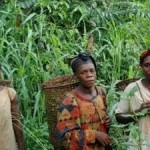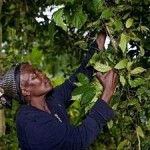Overall, exports of agricultural commodities produced on land where forests were illegally cleared drove 25% of all tropical deforestation between 2000 and 2012. The study estimates that almost 40% of all palm oil, 20% of all soy, nearly 33% of tropical timber, and 14% of all beef traded internationally comes from land that had been illegally deforested. Nearly one-fifth (17%) of Brazilian beef, 75% of Brazilian soy, and 70-80% of the palm oil and plantation wood and pulp from Indonesia were destined for foreign markets.
“Five football fields of tropical forest are being destroyed every minute to supply these export commodities,” said Lawson, noting that the report’s figures were obtained using conservative estimates based on documented violations of significant impact. “There is hardly a product on supermarket shelves that is not potentially tainted,” he added.
A Growing Problem
While the study highlights Brazil’s recent success in reducing illegal forest clearance, the report also cautions that the problem of illegal deforestation for the production of commodities intended for export is now expanding to new areas of the tropics where deforestation rates have traditionally been low – and that the same illegalities seen elsewhere are being repeated. In the Congo Basin, for instance, two out of the three largest new oil palm projects currently under development have been found to be operating illegally; one of these plantations, in the Republic of Congo, is set to double that country’s deforestation rate.
Action Needed
The report documents governance failures that undermine broader efforts to tackle tropical deforestation, including private sector initiatives on sustainable commodities and efforts by tropical forested countries to reduce legal deforestation. It argues that while the recent spate of “zero deforestation” commitments by major consumer goods companies involved in producing, trading, or consuming relevant commodities is to be applauded, illegalities relating to consumer agriculture and timber plantations can ultimately only be fully addressed by governments, and efforts to go further than legality will be held back by the need to compete with products that were illegally produced.
“Without investing in governance, our collective investments in halting deforestation and promoting forest stewardship will fail,” concluded Jenkins. “Responsible companies and environmental and human rights groups are likely to be supportive of processes to reform the complex, conflicting, and unclear laws and regulations that currently govern the forest and agricultural sectors. This is a critical step, alongside improving the enforcement and compliance of national and international laws. All must be prioritized if global commitments to stop tropical deforestation are going to be achieved.”
The report includes a range of recommendations for countries that both produce and import agricultural commodities, as well as corporations and investors in the commodity trade. The report advises producer countries, for example, to simplify and harmonize contradictory laws and regulations, including those pertaining to land use and securing tenure for Indigenous Peoples and other local communities to reduce conflicts. It asserts that governments should enforce these laws and hold companies investing in these countries accountable. Another set of recommendations call for actions by the governments of countries that import the commodities concerned.
The report notes that important lessons can be learned from previous successful initiatives to combat the trade in illegally sourced timber. Producer countries – particularly those developing trade agreements with the EU (FLEGT VPAs) – are clarifying regulatory frameworks that improve their ability to demonstrate the legality of wood products to their citizens. Consumer countries are instituting measures that have been shown to support the enforcement of producer countries’ own laws and regulations, including the development of importing trade legislation (such as the EU Timber Regulation), public procurement policies, and investment standards. However, there has been limited analysis to date on how similar mechanisms for agricultural commodities could leverage credible legal compliance, support sustainable land use policies, and increase transparency.
“The current unfettered access to international markets for commodities from illegally cleared land is undermining the efforts of tropical countries to enforce their own laws,” concluded Lawson. “Consumer countries have a responsibility to help halt this trade.”
This study was funded by the U.K. Department for International Development (DFID).
Check the following link to read/download the Full Report:
http://www.forest-trends.org/illegal-deforestation.php
Source: Forest Trends.
About Forest Trends
Forest Trends is a Washington D.C.-based international non-profit organization that was created in 1999 by leaders from conservation organizations, forest products firms, research groups, multilateral development banks, private investment funds and philanthropic foundations. Its mission is four-fold: to expand the value of forests to society; to promote sustainable forest management and conservation by creating and capturing market values for ecosystem services; to support innovative projects and companies that are developing these markets; and to enhance the livelihoods of local communities living in and around those forests. It does this by analyzing strategic market and policy issues, catalyzing connections between forward-looking producers, communities and investors, and developing new financial tools to help markets work for conservation and people. Forest Trends’ approach integrates the fundamental dimensions of ecology, economy, and equity because their goal is to have an impact on a scale that is meaningful globally and for a diverse set of stakeholders. For more information, visit www.forest-trends.org.














